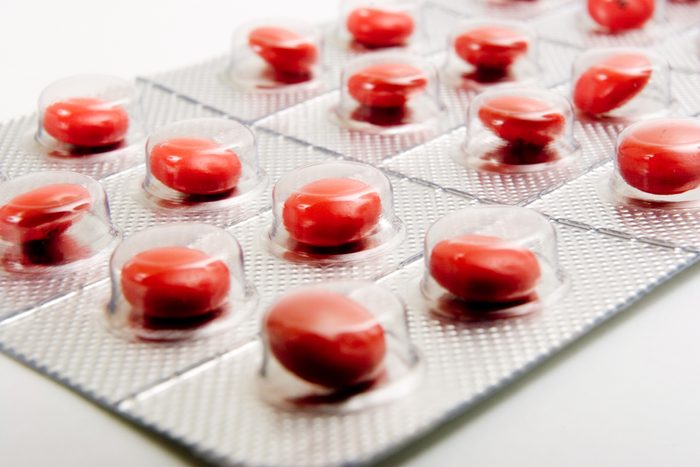The FDA Is Clamping Down on at Least 6 Major Cold & Allergy Medicines—Doctors Share 8 Solutions
Updated: Dec. 15, 2023

Just as virus and fall allergy season moves in, the aisle you visit for relief could look different. Medical doctors share their best-kept secrets to fix nasal stuffiness.
If you come down with the sniffles this season, you might be inspired to brainstorm a workaround for your go-to remedy.
This week, a group with the US Food and Drug Administration (FDA) unanimously voted that the most widely sold oral decongestant in the US—phenylephrine, an ingredient in nearly 300 million units of over-the-counter medications reportedly sold in 2022, according to CBS News—doesn’t really work. “Modern studies, when well conducted, are not showing any improvement in congestion with phenylephrine,” said Mark Dykewicz, MD, professor and section chief of allergy and immunology at Saint Louis University School of Medicine. Least effective are the oral formulations, according to the committee.
Phenylephrine, sometimes labeled as “PE,” is found in drugs such as Sudafed PE, Vicks DayQuil and NyQuil Sinex Nighttime Sinus Relief, Robitussin Peak Cold Nighttime Nasal Relief, Mucinex Sinus-Max, Theraflu and Benadryl Allergy Plus Congestion.
The ingredient came into its own in the early 2000s as a replacement for pseudoephedrine, which was moved behind the counter to curb its misuse as an ingredient to make methamphetamine.
Sources suggest the vote is not likely to shake up pharmacy shelves just yet…but for a more natural route to better breathing, we spoke with leading doctors from around the country for the congestion solutions they recommend as efficacy comes into question for this ingredient, which dominates a reported 80% of the oral decongestant category.
How to relieve congestion, according to medical doctors
The first steps to fight respiratory illness are simple, suggests Tochi Iroku-Malize, MD, MPH, president of the American Academy of Family Physicians and the founding chair and professor of family medicine for the Donald and Barbara Zucker School of Medicine at Hofstra/Northwell in Hempstead, NY. “Most important is getting plenty of rest, avoiding smoking and alcohol, and drinking lots of fluids, which can help loosen mucus and prevent dehydration,“ Dr. Iroku-Malize says.
When Is Flu Season 2023-2024, and How Intense Will It Be?
Run a humidifier
Moist air from a humidifier or a cool-mist vaporizer can soothe irritated nasal tissues, lessen sinus inflammation, and thin mucus, explains Dr. Iroku-Malize.
How to Choose the Best Humidifier for Your Space
Consider trying nasal irrigation
Rinsing out your nasal passages with a neti pot or another device can flush out sinuses and help loosen thick mucus, Dr. Iroku-Malize explains. “I counsel my patients to always use distilled or sterile water or tap water that has been boiled for three to five minutes and cooled.”
She says saltwater or saline nose drops can also loosen nasal mucus, making it easier to breathe.
Take a shower
This requires some energy, but it almost always feels better after you give yourself the push. A hot shower allows you to inhale steam, which reduces sinus pain and pressure.
A hot towel rested your face for a few moments may also do the trick.
Here’s How Long Your Shower Should Really Take, According to a Doctor on Aging
Spice things up
From Robert Glatter, MD, an assistant professor of emergency medicine at Lenox Hill Hospital in New York City: Adding these four ingredients to food may help to trigger mucus production and lead to a runny nose:
- chili peppers
- garlic
- powdered turmeric
- grated ginger
This gives mucus a fail-safe exit and will draw out nasal congestion.
13 Surprising Garlic Benefits That Will Improve Your Life
Diffuse essential oils
Eucalyptus, peppermint, and rosemary oils may potentially provide temporary relief for up to three days, Dr. Glatter says. Use aromatherapy with a diffuser. “Eucalyptus oil seems to hold the most promise when added to hot water and inhaling the steam,” he says.
Prop up your head when you sleep
Congestion often feels worst at night—says Dr. Glatter: “Raise your head with a few extra pillows while sleeping, as this may help to allow more effective drainage of nasal and sinus passages.”
These 4 Sleep Behaviors Can Help You Live Longer, Says New Research
Drink more fluids
Mom was right: “Increasing your fluid intake can loosen thick mucus blocking your nasal and sinus passages,” Dr. Glatter says. “Drinking warm beverages can help you feel less congested. “
Know when to call your doctor
Congestion and other symptoms typically run their course in a few days or a week, says Dr. Iroku-Malize. “If someone continues to have symptoms, trouble breathing, or a fever, they should make an appointment with their family doctor.”















